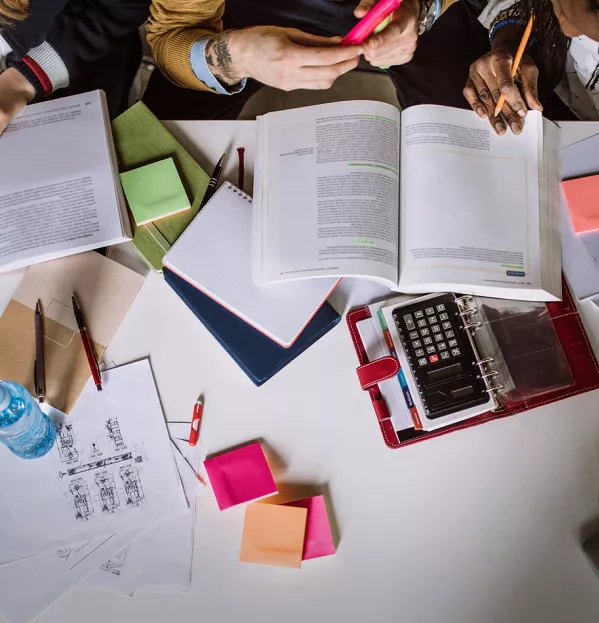- Home
- Teaching & Learning
- Secondary
- Exam revision: What is the best way to revise for GCSEs and A levels?
Exam revision: What is the best way to revise for GCSEs and A levels?

What is the best way to revise for GCSEs and A levels? Much of the time, those studying for the exams don’t know.
“Students do a whole lot of things to prepare for their exams, some of which are good uses of their time and some of which are not,” explains Professor John Dunlosky of the department of psychological sciences at Kent State University, Ohio.
Dunlosky is well-placed to tell you which techniques fall into each category: he is behind the oft-quoted paper Improving students’ learning with effective learning techniques: promising directions from cognitive and educational psychology.
Here is what works and does not work for revising for GCSEs and A levels.
Revision: what doesn’t work
So, what definitely does not work when it comes to revision? Using highlighters and rereading.
“Everyone uses highlighters; they feel that it really helps them improve their memory. But research suggests it has a very minimal impact,” Dunlosky states.
“Now, that said, I would never take a highlighter away from a student - I have a favourite highlighter I use all the time - but students need to know that highlighting is only the beginning of the journey. It is where they are identifying the content they need to learn. Highlighting by itself is relatively inert.”
Rereading is just as ineffective.
“When a student simply rereads something, it feels productive and fluent, because they have already read it. It creates an illusion of knowing, when in fact they are not actually that engaged with the material - their mind is wandering; they have read it before so it is kind of boring.
“Of course, if a student does not understand something they should go back and reread [it], but when they understand it relatively well and they are trying to learn it for the long term, rereading does not work well - in fact, studies show people get nothing out of it.”
More from John Dunlosky:
- John Dunlosky’s guide to building better learners
- How to help students take better notes
- How we embedded Dunlosky’s toolkit in our school
He is cautious, though, about warning students completely off both methods. He argues, for example, that highlighting is an easy way into study - and a useful first step.
“The reason why I highlight and why students highlight is that we are trying to be clear on what we need to know so we don’t have to go back and reread it all again - we can just focus on the content highlighted. It can also give you the sense you are staying on task. So, certainly, it is a great way to start, because it is in our comfort zone - but do not end with the highlighter!”
Inefficient, but not ineffective, revision
“Some of the things we think are not so good, if they help students to step up and study, if it helps them engage versus not engaging - so if a particular pen or colour will make you do it when you would not do it otherwise - then obviously it is a good thing,” explains Dunlosky. “If you have a favourite colour or scented pen, then why not use it - it makes learning more fun, right?”
Does studying with friends fall into this category? Dunlosky says that, actually, studying with friends is not ineffective, but it can be less efficient.

“Many students like to get together with their friends to study. We know that when that happens, the time will be used less efficiently - even if they are using a good technique - than if they were doing it on their own.
“However, if those students would not study otherwise, then by all means do it - but we should tell them that if they did it on their own, they could do the same amount of work but in less time.”
What works: retrieval and spaced practice
What works best when it comes to revision? Dunlosky puts it simply: successive relearning. This, he says, has two active ingredients: retrieval practice and spaced practice.
“A good way to explain successive relearning is to break it into its two components - there are 100-plus years of evidence showing these active ingredients have a real impact on the durability of student knowledge,” he explains.
“The first is retrieval practice. Instead of going back to reread content - say, definitions for an upcoming test - you quiz yourself on the definitions. This has a much bigger impact on performance than just rereading.
“The other ingredient is spaced practice. That is: you attempt to retrieve a concept from memory; you continue attempting to retrieve it until you can get it right in a single session - so if you get it wrong, you restudy it, and you try and retrieve it again; and then you have to come back to it, say, two days later, and you do the same again. If you don’t do anything else after this point, you will still forget it, hence you need to go back and do it again and again.
“Successively relearning in this way creates highly durable learning.”
How long should students wait during the retrieval stage before opting to restudy?
“If you cannot come up with it relatively quickly, then it is probably not going to happen,” he says. “I think it is easier to go immediately to restudy if you cannot retrieve the information, but research says it does not hurt too much if you delay - let’s say you miss one definition, you may want to go on and test yourself on the others before restudying the one you missed.”
And what sort of time periods are we talking about for spaced practice?
“There is a debate in the literature about the best schedule for spaced practice. If you have a short amount of time, I recommend spacing the critical content two or three times before the exam and then the night before, instead of cramming all night. Just use that last session to review all the material again.
“For longer periods of time, it is probably better to expand that schedule gradually, so keep the first space relatively short, then wait a week, then a month, and then after a while, it becomes semi-permanent knowledge.”

One thing that can derail the process, he warns, is if a student is poor at evaluating whether they have correctly retrieved information.
“What is key is a student’s ability to evaluate whether they have retrieved the content correctly,” he explains. “What I recommend is, instead of just trying to retrieve conceptual definitions or long explanations in your head, you should write it out. Doing so means you can physically compare what you wrote to the correct information. That comparison can help you monitor if you actually do have it correct. Not doing that runs the risk of a student thinking they have got it right when they have not.”
Given the time periods above, when is it too late to start exam revision? “It is never too late!” exclaims Dunlosky.
“The advice I would give is, the onus is on the teachers to work out what the key things the students need to know [are] and have them learn them outside the classroom. Less is more.”
More on upcoming exams
- A-levels 2024: Exam dates and key information
- GCSEs 2024: Exam dates and key information
- SQA exams 2024: Key information on Scottish assessment
Do these revision techniques work for everyone?
Dunlosky explains that it takes longer for some than others, but that it does indeed work for all students. He says that students often cannot believe how much they are able to retain using these simple techniques, but he then tells them they have been using these processes already all the time - they just didn’t know it.
“Every student is good at something,” he says. “The way they get good at those things is successive relearning. So the key is, how do we help students realise that the technique that is helping them to master something outside of education - video games, for example, or sports - is the same technique they have to engage in to excel in education?
“That is something we are really interested in, but we have not figured out that magic pill to make students do these more effective but more effortful techniques that will get the best outcomes.”
Helping poorly motivated students with revision
Motivation, says Dunlosky, is a problem that haunts much of education research.
“Motivation probably plays a very large part in this,” he admits. “How do you intrinsically motivate students to keep going until they get it right? I wish I could tell you the answer. I think it is a problem; until we really understand motivation, we cannot control for it. And if we truly understand core aspects of motivation, we can help students control it more.”
But he says that motivation cannot be seen as the golden key to helping students, either.
“Sometimes in education, people believe that simply motivating students - giving them the right mindset or grit - is going to help them out,” he explains. “I could develop a really motivated student who wants to achieve, who thinks they can achieve, but if they do not have the right tools to achieve, they will still struggle. There is a sweet spot between getting a motivated student and one who has all the right tools at their disposal.
“That is why you might have the belief [that] you can be a great drummer, but you will only excel when you go and get the lessons and get all the strategies - that, with motivation, helps you get to stardom. The same goes for education: we need motivation and the right skills and strategies.”
Dunlosky says that, ultimately, “all the prescriptions for best practice are nuanced and qualified by a whole number of factors that might work best for a particular student.”
And he has a final word for all GCSE and A-level students: “For those taking exams, good luck!”
This article was originally published on 7 February 2020
For up-to-date research and advice on supporting students with exam revision, visit our revision hub.
Register with Tes and you can read two free articles every month plus you'll have access to our range of award-winning newsletters.
Keep reading with our special offer!
You’ve reached your limit of free articles this month.
- Unlimited access to all Tes magazine content
- Save your favourite articles and gift them to your colleagues
- Exclusive subscriber-only stories
- Over 200,000 archived articles
- Unlimited access to all Tes magazine content
- Save your favourite articles and gift them to your colleagues
- Exclusive subscriber-only stories
- Over 200,000 archived articles
topics in this article



